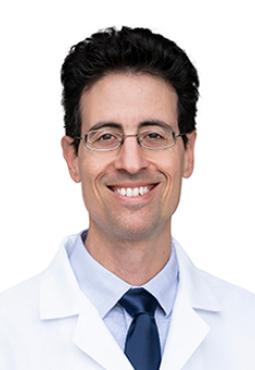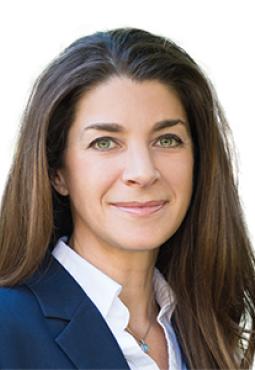Patients rave about anesthesiologist and pain management specialist Andrew T. Leitner, M.D., saying he takes the time to listen and explain “the whys and how of everything.” They call him “compassionate,” “open-minded,” “knowledgeable.”
At City of Hope since 2015, Leitner gets similar kudos from colleagues.
“He’s an amazing physician in both skill and compassion,” said Natalie Schnaitmann, L.C.S.W., executive director of City of Hope’s Department of Supportive Care Medicine. “Patients say he changes their lives.”

Leitner, the Arthur M. Coppola Family Chair in Supportive Care Medicine, will now have the opportunity to change many more lives. He is the new chair of the Department of Supportive Care Medicine, succeeding William Dale, M.D., Ph.D., the George Tsai Family Chair in Geriatric Oncology, who led the department through significant growth for six years and is now its vice chair for academic affairs, as well as continuing in his role as director of the Center for Cancer and Aging.
Many say that supportive care is what sets City of Hope apart as the premier institution for whole-patient care: a place steeped in the “body and soul” philosophy in which a person’s physical, mental, emotional and spiritual needs all receive attention.
From its earliest days, the people working in supportive are — nurses, social workers, chaplains, patient navigators, psychologists, youth counselors, child life specialists, cosmetologists and many more — made sure that patients at the Duarte, California, campus got what they needed, beyond disease treatment. It could be a wig for someone going through chemotherapy, transit passes for those needing assistance getting to their appointments, mental health services to help families cope with the trauma of a cancer diagnosis, palliative medicine to ease pain or just a quiet place, such as the Sheri & Les Biller Patient and Family Resource Center, to decompress and learn more about available aid.
First in the Nation
The Department of Supportive Care Medicine at City of Hope was the first in the United States to fully integrate across supportive care specialties and into the patient's clinical care and is one of the largest programs of its kind today. Through his leadership, Leitner will guide the department to further embed whole-person care into City of Hope's overall care delivery model across its cancer care system and, perhaps more significantly, transforming the way the medical community thinks about supportive care.
Some institutions offer supportive care as a suite of available services. But Leitner and his team don’t see supportive care as separate from patients’ basic treatment. Supportive care is integral to basic care, he says.
“We don’t own supportive care,” he asserts. “We help deliver it. And that delivery is not just a service, but an approach that puts the patient’s total needs at the center. Our buildings may house those services, but they are embedded in the culture of City of Hope.” He and others see supportive care as one of the institution’s three main pillars, along with highest quality medical care and leading-edge research. All three together help define City of Hope and make it unique.
Leitner plans to “bake” the supportive care model into every oncology team through education and support, using training and other methods, to ensure that every physician goes beyond treating disease, focuses on the larger concerns of patients and their families (to be sure, many already do), and provides easy access to resources to allay those concerns.
The next crucial step will be to take what works in Duarte beyond the main campus. City of Hope is growing, adding numerous satellite facilities across Southern California, building a major new hospital center in Orange County and expanding nationwide with new sites in Phoenix, Chicago and Atlanta. Supportive care will be a basic building block in all locations.
Ready to Deliver
Daunting, expensive tasks, requiring medical savvy plus administrative and business acumen, not to mention fundraising ability. Can the 42-year-old Leitner deliver?
He has a few tools that give him a good shot.
A native of Los Angeles and the grandchild of Holocaust survivors from Hungary, Leitner has known since childhood that he wanted to be a doctor, influenced no doubt by his father, still a practicing internist today.
He witnessed compassionate care close up and early on as a volunteer shadowing Rabbi Levi Meir on his hospital visits, “seeing his ability to connect with people going through drastic, major life changes,” he recalled.
It inspired him.
His fascination with physiology and affinity for “hands-on work” led him to anesthesiology. His desire to form lasting bonds with patients led him to subspecialize in pain management, where he’s an acknowledged leader. Leitner built City of Hope’s comprehensive pain management clinical program, and for four years he served as Supportive Care Medicine’s vice chair of clinical affairs, working with other department leaders, gaining a deeper understanding of how major institutions work, and how they are built.
And he does like to build things.
When his infant son Abe developed major allergy issues, Leitner and two friends co-founded Ready, Set, Food! The company makes supplements that can be added to baby formula, steadily introducing small amounts of allergens, to help children have a greater chance at a future of food freedom. The idea so inspired the moguls on the ABC program “Shark Tank” that businessman Mark Cuban put up $350,000 and formed a partnership with the trio. The products now sell nationwide, with tens of thousands of families benefiting.
“By nature, I’m a builder. I have that entrepreneurial spirit,” he said. “I enjoy engaging and fostering teams to be greater than the sum of their parts.” He’s eager to bring those team-building skills to his new job “to look at new ways to meet patients’ needs. It’s exciting for me.”
Team Support
His executive director is excited, too.
“He sees the big picture,” said Schnaitmann, herself a supportive care pioneer. Upon arriving at City of Hope in 2007, Schnaitmann helped put in place the initial building blocks of the department. She also designed the Sheri & Les Biller Patient and Family Resource Center and brought it to reality. She enjoyed working with Leitner as a peer and expects big things from him in the top job. “He has deep skills on the clinical side, plus a very strong operational business mindset. He pulls together knowledge from many areas in a very natural way. He’s extremely calm, level-headed and action-oriented. He’s kind, he’s funny. He’s balanced, and just a really good person.”

City of Hope committed itself to supportive care long before most other cancer institutions, and history has shown it was the right decision. Study after study confirms that supportive care improves cancer outcomes. It is that kind of “evidence-based” supportive care that Leitner and his team now seek to expand systemwide, so that even more people can receive it, regardless of where they happen to be.
“Supportive care is a mechanism for democratizing cancer care,” said Leitner. “Today in the United States, your cancer care depends on where you live and where you go. City of Hope’s mission is to improve access to care, and supportive care plays a role in that.”
In his new position, Leitner hopes to bring new awareness to all the impact that supportive care medicine can make for patients — physically, socially, emotionally, financially and spiritually. Those who've experienced his care firsthand expect him to succeed because of the qualities he brings to the table. "He knows me as an individual, not a medical number," said one. "Knowing that you're being heard makes all the difference."
The Department of Supportive Care Medicine at City of Hope was the first in the United States to fully integrate across supportive care specialties and into the patient’s clinical care and is one of the largest programs of its kind today. The program provides cancer patients with comprehensive physical, psychological, social and practical support services, including care navigation; survivorship programs; specialists in cancer and aging; child life specialists; psychological and spiritual counseling; pain management; integrative medicine, such as yoga, massage and meditation; and more — all with a focus on maximizing patient and family strengths, quality of life and the ability to best engage in their treatment journey and beyond. Thanks to a gift from The Sheri and Les Biller Family Foundation, City of Hope is working to expand this offering across its cancer care system and to advocate for establishing supportive care as a standard best practice for cancer care in the United States.
